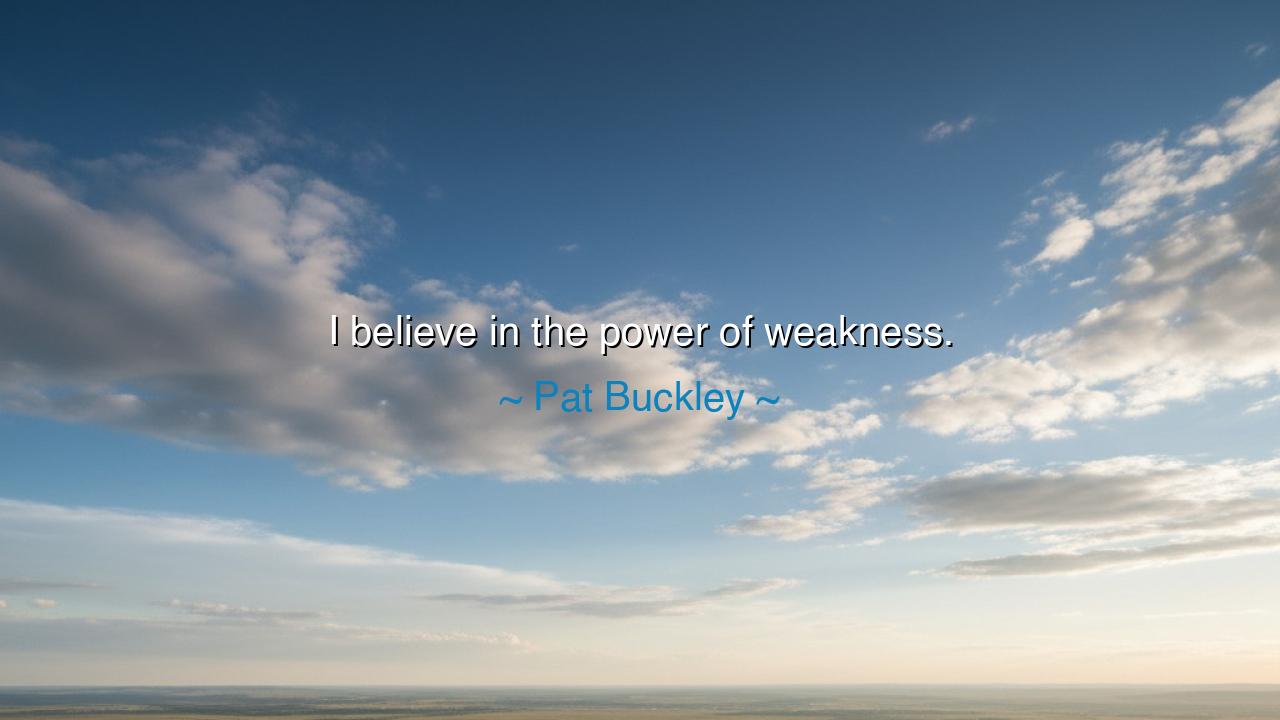
I believe in the power of weakness.






There is a paradox at the heart of the human soul: what seems frail may in truth be mighty, and what appears strong may hide great fragility. When Pat Buckley proclaimed, “I believe in the power of weakness,” she unveiled a mystery that sages and saints have known for centuries—that true strength often emerges not from domination, but from vulnerability, humility, and endurance. Weakness, when embraced with courage, becomes a hidden wellspring of transformation.
To the proud, weakness is something to be feared or despised. They believe that only displays of control and force command respect. Yet those who seek to conquer others often fall victim to their own unchecked power. The one who accepts their weakness, however, gains a different kind of power—the power of empathy, of resilience, and of spiritual depth. In this way, weakness ceases to be a chain and becomes a source of liberation, teaching us to bend without breaking, to endure without losing hope.
History bears witness to this truth. Consider the life of Mahatma Gandhi, who faced the might of the British Empire not with swords or armies, but with the seeming weakness of nonviolent resistance. To many, his refusal to fight appeared like surrender. Yet his steadfastness awakened the conscience of millions and brought down an empire. In his apparent weakness, Gandhi wielded a power far greater than that of his oppressors, proving that the soul’s quiet strength can overcome the weapons of kings.
Even in the realm of faith, this paradox shines brightly. In the early days of Christianity, the followers of Jesus were hunted, tortured, and killed. They had no armies, no wealth, no political influence. And yet, their willingness to embrace suffering without hatred became a force that ultimately reshaped the Roman world. Their weakness, offered with love and conviction, became a power that outlived emperors and empires.
Let this teaching be passed to all who seek wisdom: do not despise your weakness, for within it lies the seed of strength. When you acknowledge your limits, you open the door to growth and connection with others. When you choose humility over pride, patience over violence, you wield a power unseen by the world but deeply felt by the soul. In this way, even the smallest voice can move mountains, and the frailest heart can change the course of history. True greatness is not in never falling, but in rising again, made stronger by the very weakness that once seemed to hold you down.






CClown
I feel intrigued by the concept because it challenges conventional ideas about strength. Could admitting weakness actually build resilience in ways that apparent strength cannot? It makes me consider whether society undervalues subtle forms of influence, like patience, empathy, or adaptability. I’d like to explore examples where perceived weakness became a catalyst for success, change, or leadership, and how individuals can consciously leverage this paradox in everyday life.
NMThu Do Nguyen Minh
This perspective feels both liberating and counterintuitive. It suggests that acknowledging vulnerability or limitations might open doors to personal development and authentic interaction. I wonder how culture and upbringing shape our views on weakness—do some environments encourage its transformative potential, while others suppress it? It also raises the question of whether ‘power of weakness’ applies more to emotional and moral realms than physical or material ones.
MCLe Thi My Chau
Reading this evokes curiosity and a bit of skepticism. How can weakness, often seen as a disadvantage, be a source of influence or insight? Perhaps it allows for empathy, humility, and the ability to learn from others. I’d like to understand the practical implications of this perspective: can individuals or organizations harness ‘weakness’ strategically, and if so, what does that look like in leadership, relationships, or creative endeavors?
PHnguyen phuong hoa
This statement makes me reflect on the unconventional idea that weakness can be a form of strength. How do we define weakness in a way that allows it to be empowering rather than limiting? Could embracing vulnerability actually foster deeper connections and personal growth? I also wonder whether society’s traditional valorization of strength and resilience overlooks the quiet but transformative power found in admitting limitations and asking for help.